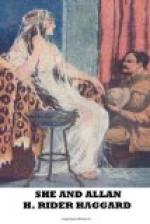“Allan, the vision faded and when I awoke the lights of dawn played upon the image of the goddess in the sanctuary. They played, moreover, upon the holy jewelled thing that in my dream her hand had held, the sistrum of her worship, shaped like the loop of life, the magic symbol that she had vowed to me, wherewith goes her power, which henceforth was mine.
“I took it and followed after the priest Kallikrates, to whom thenceforward I was bound by passion’s ties that are stronger than all the goddesses in this wide universe.”
Here I, Allan, could contain myself no longer and asked, “What for?” then, fearing her wrath, wished that I had been silent.
But she was not angry, perhaps because this tale of her interviews with goddesses, doubtless fabled, had made her humble, for she answered quietly,
“By Aphrodite, or by Isis, or both of them I did not know. All I knew was that I must seek him, then and evermore, as seek I do to-day and shall perchance through aeons yet unborn. So I followed, as I was taught and commanded, the sistrum being my guide, how it matters not, and giving me the means, and so at last I came to this ancient land whereof the ruin in which you sit was once known as Kor.”
CHAPTER XIV
ALLAN MISSES OPPORTUNITY
All the while that she was talking thus the Lady or the Queen or the Witch-woman, Ayesha, had been walking up and down the place from the curtains to the foot of the dais, sweeping me with her scented robes as she passed to and fro, and as she walked she waved her arms as an orator might do to emphasise the more moving passages of her tale. Now at the end of it, or what I took to be the end, she stepped on to the dais and sank upon the couch as if exhausted, though I think her spirit was weary rather than her body.
Here she sat awhile, brooding, her chin resting on her hand, then suddenly looked up and fixing her glance upon me—for I could see the flash of it through her thin veil—said,
“What think you of this story, Allan? Do you believe it and have you ever heard its like?”
“Never,” I answered with emphasis, “and of course I believe every word. Only there are one or two questions that with your leave I would wish to ask, Ayesha.”
“By which you mean, Allan, that you believe nothing, being by nature without faith and doubtful of all that you cannot see and touch and handle. Well, perhaps you are wise, since what I have told you is not all the truth. For example, it comes back to me now that it was not in the temple on the Nile, or indeed upon the Earth, that I saw the vision of Aphrodite and of Isis, but elsewhere; also that it was here in Kor that I was first consumed by passion for Kallikrates whom hitherto I had scorned. In two thousand years one forgets much, Allan. Out with your questions and I will answer them, unless they be too long.”




